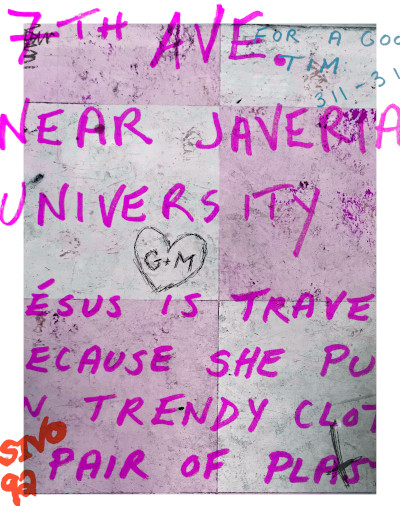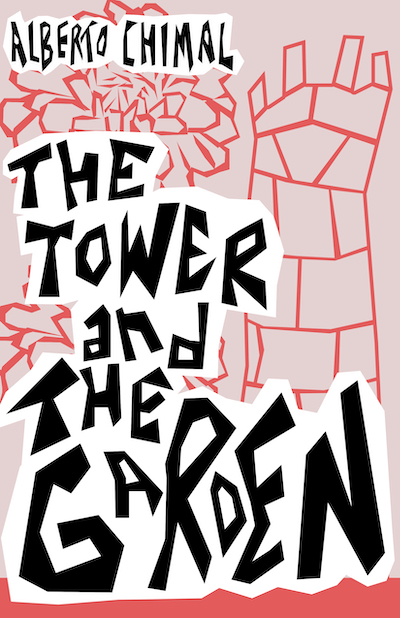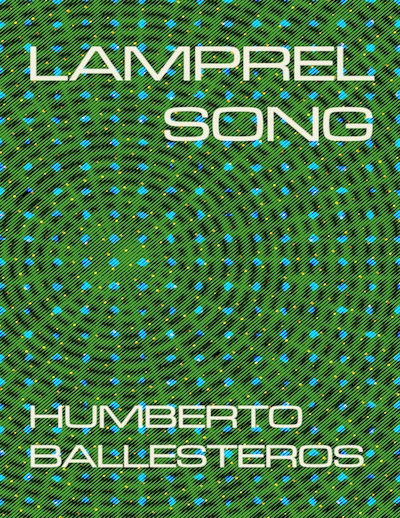
DISCLAIMER: All translations presented here are personal, unofficial, and in progress.
CEPHALOMORPHIC by Luis Carlos Barragán

translation of "cefalomorfos" by luis carlos barragán from parásitos perfectos (ediciones vestigio, 2021)
ffo: fungi, psychic fungi, family resentments, fungi-assisted therapy
(click image for pdf)
SEVENTH AVE., NEAR JAVERIANA UNIVERSITY by Luis Carlos Barragán

translation of a chapter from vagabunda bogotá by luis carlos barragán (angosta editores, 2017)
ffo: queer trans punks
(click image for pdf)
THE TOWER AND THE GARDEN (CHAPTER ONE) by Alberto Chimal

a zine of my translation of the first chapter of alberto chimal's la torre y el jardín
ffo: creepy, weird, creatures, the horrors of patriarchy and wealth
(click image for pdf)
LAMPREL SONG by Humberto Ballesteros

a zine of my translation of the short sci-fi story "sueño con lampreles" by humberto ballesteros
ffo: plants, old school sci-fi, fuck earth prisons, schubert
(click image for pdf)
SPELL by Darío Jaramillo Agudelo
Why not here your mouth
why not on my skin your breath
why not me within your depths?
translated by books Lozano, 2024
ALBUM by Alberto Chimal
Her mother’s face / The doll she threw from the window / The book she burnt / The fish tank she emptied across the living room floor / The doll she tore limb from limb / Her first psychiatrist / The dish she wielded against her mother / Her nanny just before she left / Her mother’s mother just before she left / Her father just before he left / Her mother’s face / The cat she put in the oven / Her second psychiatrist / Her first kindergarten / The boy she kicked / Her third psychiatrist / Her classmate’s cut braid / The corner where she was punished / Her classmate’s cut face / Her fourth psychiatrist / Her second kindergarten / The dog she gutted / The chair she was tied to / Her mother’s arm in a sling / Her teacher’s arm in a sling / Her fifth psychiatrist’s arm in a sling / Her third kindergarten / The boy who hit her / A chunk of ear of the boy who hit her / Her fourth kindergarten / The report filed against her / Her mother’s purse / The elementary school principal who refused to admit her / Her mother’s face / The second elementary school principal who refused to admit her / Her mother’s debit card / The elementary school principal who agreed to admit her / The girl she tried drowning in a toilet / The girl she pushed down the stairs / The letter written against her by her classmates’ parents / Her mother’s face / Her mother’s bared shoulder / The second elementary school principal who agreed to admit her / The sweater of her missing classmate / The body of her missing classmate / Her mother’s face / The cops who came looking for her / Her mother’s face / The bus she and her mother boarded / The first motel where she and her mother slept / The fire at the first motel where she and her mother slept / The news bulletin with her mother’s picture / Her mother’s face / The second motel where she and her mother slept / The baby who lasted three days in the room where she and her mother slept / Her mother’s face / The third motel where she slept / The phone her mother tried to dial / Her mother’s face / One of her mother’s eyes / Her mother’s tongue / Her mother’s other eye / The car of the man who picked her up off the highway / The first commentator to talk about her on TV / The car of the second man who picked her up off the highway.
“Album” by Alberto Chimal, published as “Álbum” in Estos son los días (Ediciones Era, 2004), translated by books Lozano, 2023.
from LOS ABISMOS by Pilar Quintana
Mom suggested we go for a walk. She never went out with me and dad in Cali, so I looked at her surprised.
“What’s wrong with that?” she asked.
We pulled on jeans, t-shirts, and rubber boots and tied sweaters around our waists in case it got cloudy and cold. Then, the two of us went up the stone drive, opened the black steel gate, and stepped out onto the unpaved road.
We walked slowly, looking at the houses, old and new, built of brick or wood, with large and small windows, sloped or flat roofs. There were all different kinds and they had gardens filled with flowers and fruit trees, pine hedges from behind which dogs barked at us or wagged their tails.
We crossed paths with another pair of pedestrians — old people with hats and walking sticks — a peasant hauling a heavy load on his shoulders, and a parade of young revelers carrying a giant boombox with music in English and passing around a bottle of aguardiente.
We saw a flock of green parakeets with blue markings around their eyes, a lone cow grazing on a treeless plot, and two gorges with high crags and noisy waters like an angry crowd.
Next, we came to a stretch of woods where the world got darker. There were trees weighed down with moss, big-leaved plants, fallen trunks rotting on the ground, and a light post consumed by a rust-like orange fuzz. A curve followed and at the end of the curve, a cliff. We drew closer. Slowly, uncertain. Skinny trees gripped the mountain’s rocky face, and just after that the land dropped off as if split by an axe.
I felt very small — like the baby girl looking out at our apartment’s staircase from behind the safety gate, but now without the gate. Me, with nothing more than my body, at the edge of an actual cliff. The canyon was narrow at that point and, down there, the river, which collected streams and rivulets from the mountain, was covered with vegetation, an untamed jungle.
I thought about dead women. Leaning over the cliff was like looking into their eyes. Into the eyes of Gloria Inés, fiery as a mare and then, later, crumpled against the sidewalk. I looked up at my mom, who was, like me, bending toward the abyss.
“We’d better head back,” she said.
from Los abismos by Pilar Quintana, pp. 151-153, translated by books Lozano, 2021
"THERE ARE PEOPLE WHO ARRIVE STOMPING..." by José Manuel Arango
There are people who arrive stomping
who yell and give out orders
who feel at home in this world
People who consider everything theirs
who break and uproot
who don’t even thank the air
And no bone pains them they don’t doubt
nor do they feel fear they walk upright
and speak familiarly even with death
Frankly I don’t know how they do it
how they don’t understand
translated by books Lozano, 2021